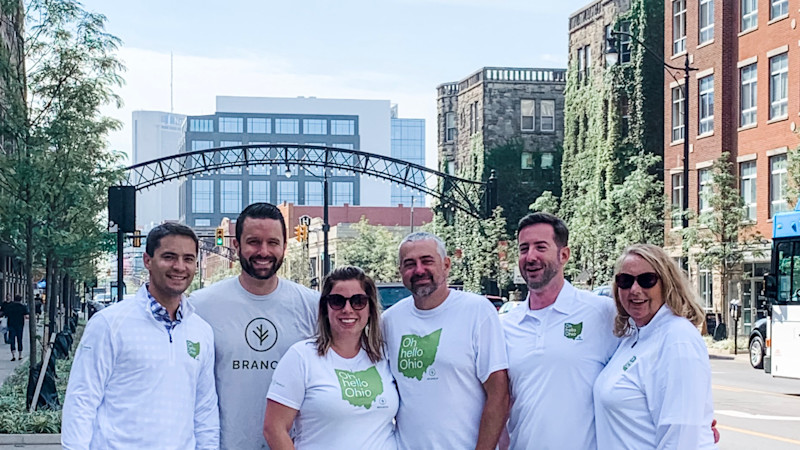- Iterate
- Meet The Team
- How Columbus, Ohio Became the Hub for American Insurance Innovation
How Columbus, Ohio Became the Hub for American Insurance Innovation
“Columbus has everything you could want in it, and nobody knows of it yet,” said Steve Lekas, the co-founder of Branch Insurance.

When they started home and auto insurance company Branch Insurance in 2017, co-founders Steve Lekas and Joe Emison lived in Ohio and North Carolina, respectively. They needed to establish a central headquarters. After comparing more than 200 U.S. cities, they “narrowed it down algorithmically on 83 fields of data and a 15-point criteria set” to 21 potential cities. Then, Lekas said, they began asking around to see which might be most attractive to the talent pool they’d need to build the company.
One rose to the top: Columbus, Ohio. It had the perfect combination of light traffic, nearby universities, a burgeoning-but-not-yet booming startup community, and a low cost of living that could allow Branch to pass savings onto its customers.
“Columbus has everything you could want in it, and nobody knows of it yet,” Lekas said in an interview with The Org.
Branch Insurance, which closed a $22 million Series A round in July 2020, is a comparatively young company in the city’s insurtech space, which boasts several other recent big wins. Property and casualty insurance firm Root raised more than $500 million before its October IPO, in which it raised another $760 million. Commercial insurance exchange Bold Penguin was acquired by American Family Insurance for an undisclosed sum in mid-January.
Columbus has been an insurance hub for decades, dating back to the founding of the Ohio Farm Bureau Federation in 1919, Lekas said. Nationwide, State Auto, Grange, Safe Auto, Encova and other insurers have long called the city, which is Ohio’s state capital, home. Naturally, insurtech disruptors followed.
“The magic ingredients exist here,” said Alex Frommeyer, co-founder of Beam Dental, a dental insurance company with around 250 employees. “The skill sets that are just plentiful (in Columbus) are some very, very specific insurance roles, like underwriting and actuarial science. There’s also the insurance versions of legal and compliance, of marketing, and of roles in customer service or account management.
"Yeah, there’s customer support in a lot of different industries, but there’s specific lingo and concepts that it really helps to have a background in.”
While they’ve had no trouble finding insurance-specific employees, Frommeyer said, the city of nearly 900,000 doesn’t yet have a critical mass of tech workers who specialize in specific programming languages or design skills. Beam is working to build that critical mass by training the employees it needs itself.
“If we really prize a specific skill set, we teach it,” Frommeyer said. “If we can't find enough people to join the team to do it, we’ll look at and strategize around inviting people into our business who have a similar or analogous skill set, and then we provide, essentially, the coding camp that helps transition those skills. That’s just a piece of what building incredible talent density inside the business looks like from our perspective.”

Columbus is home to several venture capital firms, most notably Drive Capital, which has invested heavily in Beam Dental as well as companies like Duolingo and Udacity.
But many insurance companies have venture arms as well. Branch, for example, raised its Series A from investors including American Family Ventures.
“There are absolutely venture and angel funds in Columbus, but it never hurts to have more, because the diversity of thought is always appreciated,” said Amelia Gandara, a principal at Nationwide Ventures, the investment and partnership wing of Nationwide. “You need people who look at problems from different angles.”
Gandara’s Columbus-based team has tripled in size, from three people to nine, since she joined in 2018. The fund invests in insurance companies, but also in a wide variety of other spaces that insurance touches: Mobility, homeownership and home management, telematics and more. A recent success for the fund includes Flo Technologies, a home monitoring system that shuts off water when it detects water leaks that was acquired by Moen last year.
Gandara said that as insurtechs like Root, Bold Penguin, Beam Dental and Branch grow, Columbus is beginning to see evidence of an ecosystem: Employees moving back and forth between startups and legacy carriers and developing their own new ideas.
“When you have an insurtech IPO, for some of those employees that had stock options in the company, that provides liquidity opportunities for them that might inspire them to start something of their own. You start to see that flywheel,” she said. “You’ve already got this embedded talent around insurance and financial services, and it’s that much easier to recruit for the next incremental insurtech that gets started.”
Some of those nascent companies, Gandara believes, will address well-known pain points in home and auto insurance. But she also expects to see the creation of a variety of insurance products to address new challenges: Everything from security deposits on apartments to issues surrounding long-term care and retirement.
There’s no reason to think that innovation won’t happen in Columbus.
“One of the direct impacts of successful startups in a place is that people have seen it happen,” Beam Dental’s Frommeyer said. “Once you start to actually know somebody who has helped see a company through to an IPO, or once you’ve seen somebody that’s been a leader in a business that’s raised tens or hundreds of millions in venture capital, or once you’ve known somebody who has dramatically accelerated their career… then it really becomes the identity of a local economy. All of a sudden everybody wants to build things and grow things and take a long-term value creation mindset.”
“Columbus is a big city,” he continued. “But you create 2,000 jobs in five years that are explicitly the innovation economy — that has a ripple effect on the psyche of tens of thousands of people.”
From 2018 to 2019, tech job postings in Columbus jumped 38% and salaries increased by 14%, one study estimated. The metro area gained around 50 people per day in 2019. During the first 10 months of 2020, home prices jumped nearly 10%, with growth accelerating throughout the year.
“We need more startups, we need more people, we need more people investing outside of the (coasts),” Lekas added. But he believes the culture change needs to go deeper than that: “We need the Midwest to recognize that it can change the world.”

If the city continues to grow, both founders hope it will do so thoughtfully, preserving the affordability and civic-mindedness that drew them to the city.
“It’s not about getting more inputs at this point. It’s about making sure that the output is shared by a much larger group of people than has been true in lots of other cities that have gone through this transformation,” Frommeyer said, mentioning San Francisco, Seattle and Austin. “The Midwest can and should do it better. Columbus is aware enough to see this coming and do something about it, and it’s incumbent on the founders and the entrepreneurs, the employees of these businesses, the investors in these businesses, and the ecosystem to make sure that when new exciting businesses are built and become incredibly valuable.
"The rising tide raises, truly, all the boats.”
--
The Org is a professional community where transparent companies can show off their team to the world. Join your company here to add yourself to the org chart!
In this article


The ORG helps
you hire great
candidates
Free to use – try today